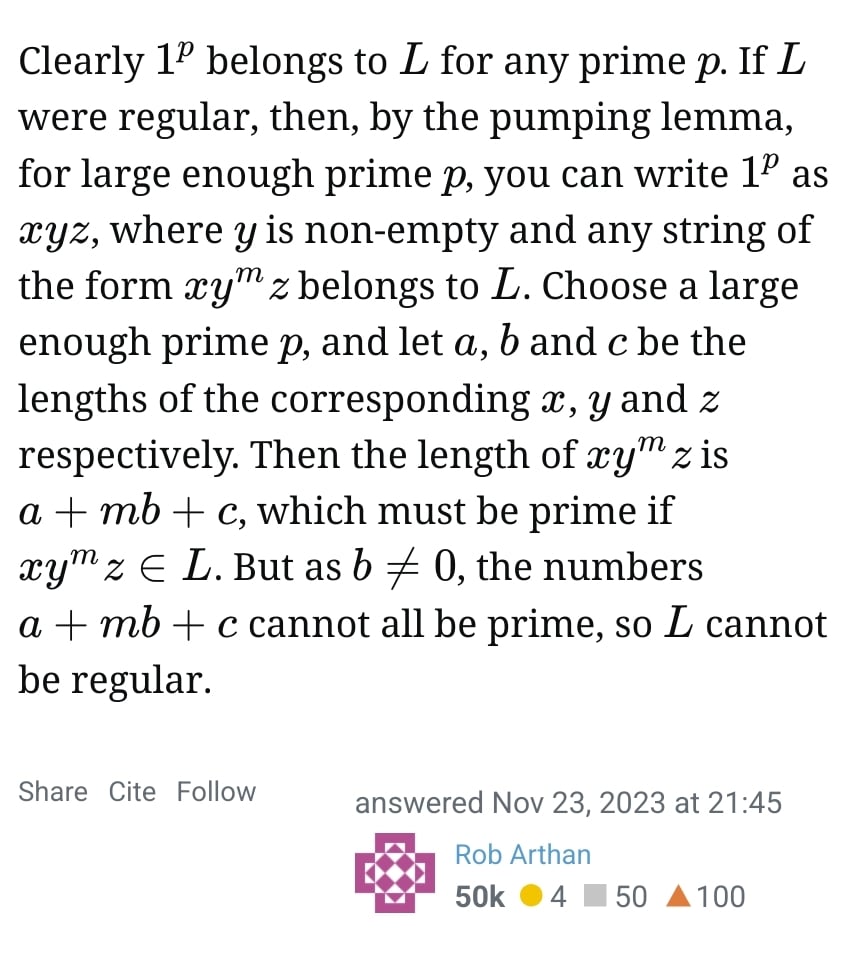

Did any distro give concrete reasons for why they have actively chosen not to package it, or perhaps they just haven’t given it much thought yet?


Did any distro give concrete reasons for why they have actively chosen not to package it, or perhaps they just haven’t given it much thought yet?


This is not what I would consider a “political reason”. A political reason would be something like refusing to package it because of what political party Howard supports.
There is plenty of software you’ll find in these repositories that aren’t under the GPL. CMake uses BSD, the Apache web server uses the eponymous Apache license, LibreOffice and Firefox use MPL, Godot and Bitcoin Core use the MIT license, and I’m sure there are plenty of other software licenses that I haven’t thought of yet.


If the set of all strings of composite length is a regular language, you can use that to prove the set of all strings of prime length are also a regular language.
But it’s also easy to prove that the set of language of strings of prime length is not regular, and thus the language of strings of composite length also can’t be regular.


You got downvoted here but you’re absolutely right. It’s easy to prove that the set of strings with prime length is not a regular language using the pumping lemma for regular languages. And in typical StackExchange fashion, someone’s already done it.
Here’s their proof.
Claim 1: The language consisting of the character 1 repeated a prime number of times is not regular.

A further argument to justify your claim—
Claim 2: If the language described in Claim 1 is not regular, then the language consisting of the character 1 repeated a composite number of times is not regular.
Proof: Suppose the language described in Claim 2 is regular if the language described in Claim 1 is not. Then there must exist a finite-state automaton A that recognises it. If we create a new finite-state automaton B which (1) checks whether the string has length 1 and rejects it, and (2) then passes the string to automaton A and rejects when automaton A accepts and accepts when automaton A rejects, then we can see that automaton B accepts the set of all strings of non-composite length that are not of length 1, i.e. the set of all strings of prime length. But since the language consisting of all strings of prime length is non-regular, there cannot exist such an automaton. Therefore, the assumption that the language described in Claim 2 being regular is false.


Average Matt Parker code


“at least 2 characters repeated [at least] twice” implies the string’s length is divisible by a number greater than 1.


Yeah but it’s just so tempting… It validates so many inputs so easily…


They said—
A line with exactly 0 or 1 characters, or a line with a sequence of 1 or 3 or more characters, repeated at least twice
Note—
…or a line with a sequence of 1 or 3 or more characters, repeated at least twice
It should be—
…or a line with a sequence of 2 or more characters, repeated at least twice
The regex in the post will match “abab”. Their original description (line 2 of this comment) will not match “abab”.


It’s a line with a sequence of two or more characters repeated at least twice.


Yeah, so It turns out fewer people care about and really want those things than you think…


Because the “US Government” is not a monolithic entity but rather, a large and complex democratic organisation that citizens can influence the composition of through political participation.


If that’s what’s needed, I can say with some certainty that adoption isn’t going to be picking up any time this decade.


I still have no idea how to use passkeys. It doesn’t seem obvious to the average user.
I tried adding a passkey to an account, and all it does is cause a Firefox notification that says “touch your security key to continue with [website URL]”. It is not clear what to do next.


“[The] main reasons that motivate editors to add AI-generated content: self-promotion, deliberate hoaxing, and being misinformed into thinking that the generated content is accurate and constructive,” Lebleu said.


No, which is why I said it’s not a monopoly. It’s a different form of anti-consumerism.


I don’t think Apple’s business model fits the definition of “monopoly”, but they are a different kind of anti-competitive, in my opinion. Forcing users to use your own ecosystem by forcing competitors to be shittier or nonexistent through technical means is still anti-competitive.
It seems you’re right. I did not know that.
That’s true. Mullvad will even let you send cash by post to them which is definitely not something you can do with other services.
However, in terms of private payment options, you can always use BTC’s Lightning Network with the other options if that concerns you.
The VPNs you characterise as “shitty” aren’t necessarily a bad choice; they’re cheaper than the legitimate privacy VPNs. Mullvad is famously 5€ per month, Proton is 4.49€ per month, but NordVPN is 3.09€, Surfshark is 2.19€, and PIA is 1.79€ per month.
If you’re really just here to pretend you’re in another country (rather than privatemaxing) or hide your torrenting activity from your ISP, the cheaper options can be a perfectly legitimate choice.
Law enforcement shouldn’t be able to get into someone’s mobile phone without a warrant anyway. All this change does is frustrate attempts by police to evade going through the proper legal procedures and abridging the rights of the accused.